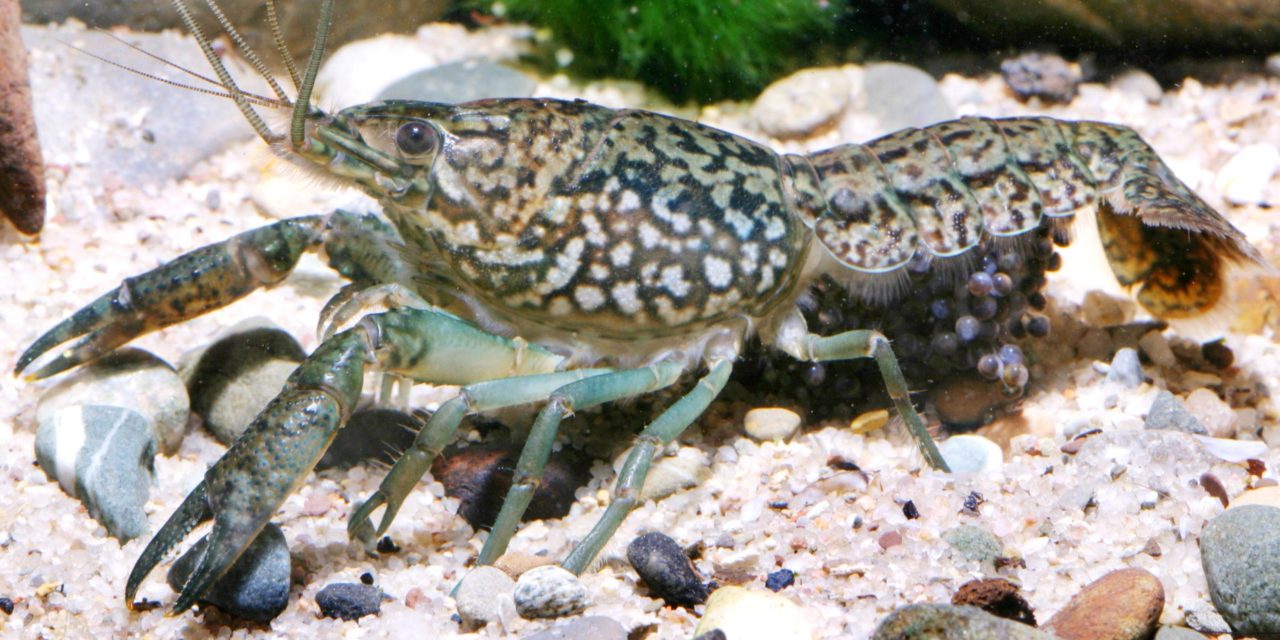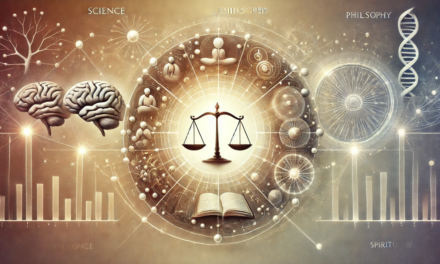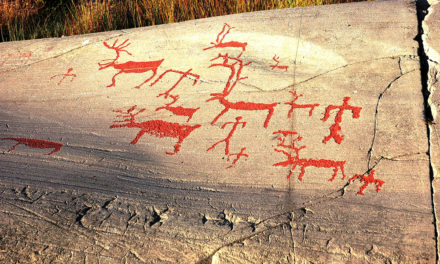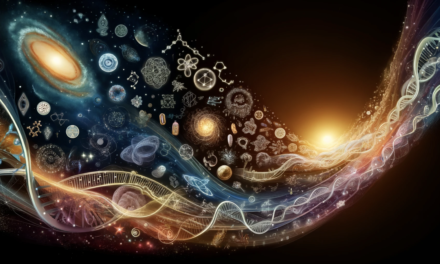My studies in Progressive Christianity have led me to write articles about how inequality is a part of the ‘human predicament’ and how Jesus, as a prophet deeply schooled in the traditions of the Hebrew Bible saw ‘Empire’ as a fundamental characteristic of humanity alienated from the God worshipped by the Jews, who he referred to as ‘Father.
And I’ve assembled quite extensive evidence that society is becoming more unequal along with corresponding assertions that humanity should be striving to create a fairer and less unequal society. I’ve recognised the natural phenomena of hierarchy and pecking order among other ‘social’ species, but argued that as the only known self-reflectively conscious species, we humans have a duty to our planet not only to save it and ourselves from destruction, but also to use our capabilities to do better than simply encourage ‘the law of the jungle’.
But then, reading The Hidden Half by Michael Blatland, I learned about the Marbled Crayfish (marmorkrebs) and in particular some research published in 2008 and it pulled me up with a shock. A group of German biologists discovered that the marbled crayfish produced genetically identical offspring since they had no need of their eggs being fertilised by a mate. Using this discovery, they conducted an experiment in which batches of identical offspring were bred to maturity in identical, hermetically controlled environments. Nevertheless, Blatland explains, although ‘they were genetically identical, in a world where everything was as far as possible identical, and they were chalk and cheese. One crayfish, for example, grew to be twenty times the weight of another.
The visible differences [were] stunning, and size [was] only the first. Every single marmorkrebs of several hundred studied had a unique pattern of marbled markings. There were visible, physical differences in their sensory organs, differences in internal organs, differences too in how they moved and rested: some sat under shelter, others lay on their backs. Another big variation was lifespan, which ranged from 437 to 910 days. … There were more differences in how they socialized. Brought together in one tank, they soon fell into hierarchies, some submissive, some dominant. Some were solitary, others liked a crowd.’
So, this is causing me to reconsider just what it is that we are doing by setting out to resist ‘Empire’ in all its forms. I already understand from my studies of complexity that randomness and uncertainty are characteristics of the physical world, but I had no idea that diversity and inequality were fundamental to the very development of life in all its forms. Does that mean that what we are called to is “respect and compassion” rather than “the removal of inequality”?
In Luke 13:1-5 the evangelist writes, “At that very time there were some present who told him about the Galileans whose blood Pilate had mingled with their sacrifices. He asked them, “Do you think that because these Galileans suffered in this way they were worse sinners than all other Galileans? No, I tell you; but unless you repent, you will all perish as they did. Or those eighteen who were killed when the tower of Siloam fell on them—do you think that they were worse offenders than all the others living in Jerusalem? No, I tell you; but unless you repent, you will all perish just as they did.”
Could that, perhaps, be Jesus saying, “stuff happens, and everybody needs a fundamental change of mindset”?
The more I study, the more I conclude that the mystery of existence far outweighs any certainty that we may have,







HI Terry,
Extrapolating from crayfish to mankind seems a fair stretch!! Correct me if I am wrong but does not the “Good Book” claim God gave man dominion over the Earth? A mistake clearly (can God make a mistake?) as we have made right mess of it so far! Your suggestion that we should have “respect and compassion”would be shared by all right minded people of all religions and none. But without action they are empty words – passing a beggar on the streets respect and compassion might stop you from kicking him out of the way and compassion make you give him some money, or even go further to help that individual. However if you still support/vote for the neo liberal free market system that drives the inequality that forces people on the streets in a World of plenty, your claim to be a follower of Christ would wring rather hollow with me.
Look froward to talking to you
Thanks a million for commenting on my somewhat hasty and deliberately provocative post.
You are surely right to say that words without action are empty. And ‘respect and compassion’ are values that apply to the impact of systems, as well as to individual behaviour. You imply that people who follow Christ should strive for a fairer and more just society, and I completely agree with that.
What I’m saying is something rather different and is not designed to influence how people vote. I suppose the thrust of my suggestion is that Jesus was more of a realist than some of his more idealistic followers. He was a first-century Jew and used the language and concepts current for his time and place. I quote his words as a record from an ancient historical document, not as a message from ‘God’. But that is a much bigger discussion, and it will be great if we have the time to follow it up on a few days’ walking in the summer.
Behind the short post, as it happens, is a sea-change in the way I perceive the world. It is a complex story, and I want to examine it rigorously while committing it to writing. In the meantime, I’ll try to provide some flavour of the ‘metanoia’ that my thinking has undergone.
It would be fair to say that when I started reflecting on my experiences on my Camino to Santiago do Compostela and discovered the ‘Journey of the Universe’, I was tending to perceive science through the lens of Christian theology. You can see this viewpoint represented in my blog post ‘A New Story’, which you kindly commented on in June 2019. It is probably also fairly representative of how I thought when we last met. In the intervening months, I have read extensively in theology, the humanities, and science. And somewhere along the way, perhaps about when I wrote “The Danger and Fascination of Stories” (which you also commented on last October), I think the lens became reversed. I started to perceive Christian Theology (and indeed all religions) through the lens of science. Particularly evolutionary science, recognising the three great phases of evolution as physical, then biological, and now cultural. Between each, irreversible thresholds were passed, although the earlier phases continue to operate as substrates on which later ones play out.
I was very grateful for your recommendation of Brian Greene’s “Until the End of Time”, which I read from cover to cover in less than a week – so much did it engage me. It was particularly relevant to my current thinking since I had only recently read Jeremy England’s “Every Life is on Fire”, Martin Hägglund’s “This Life”, and Douglas Hofstadter’s “I am a Strange Loop”. Greene discusses what he calls ‘nested stories’, each told in the purest form in the language of mathematics, but each has to be consistent with those upon which it was built. For instance, biology has its own language upon which research and knowledge are based, but that does not deny the underlying language of chemistry, physics, and mathematics.
My article talks about marmorkrebs using the language of biological evolution. Although discussions about inequality and injustice belong in the realm of cultural evolution, they still rest on the substrate of biological realities. That’s the stretch I was making in jumping from marmorkrebs to Jesus.
There is much more to say, and I look forward to having the opportunity to discuss it. I have just finished reading the brand new book “Conflicted” by Ian Leslie, which has led me to “The Enigma of Reason” by Dan Sperber and Hugo Mercier. They both see ‘reason’ as a social asset rather than a purely individual one. And that has given me added energy for ‘disputation’ as a way of navigating towards the highest quality conclusions that are possible to us biased and tribal beings!
Keep well.
Thanks Terry. Good to talk with you and Alan. Your posts provide a host of insights that I really look forward to discussing if I do manage to get back to the UK for our walk.